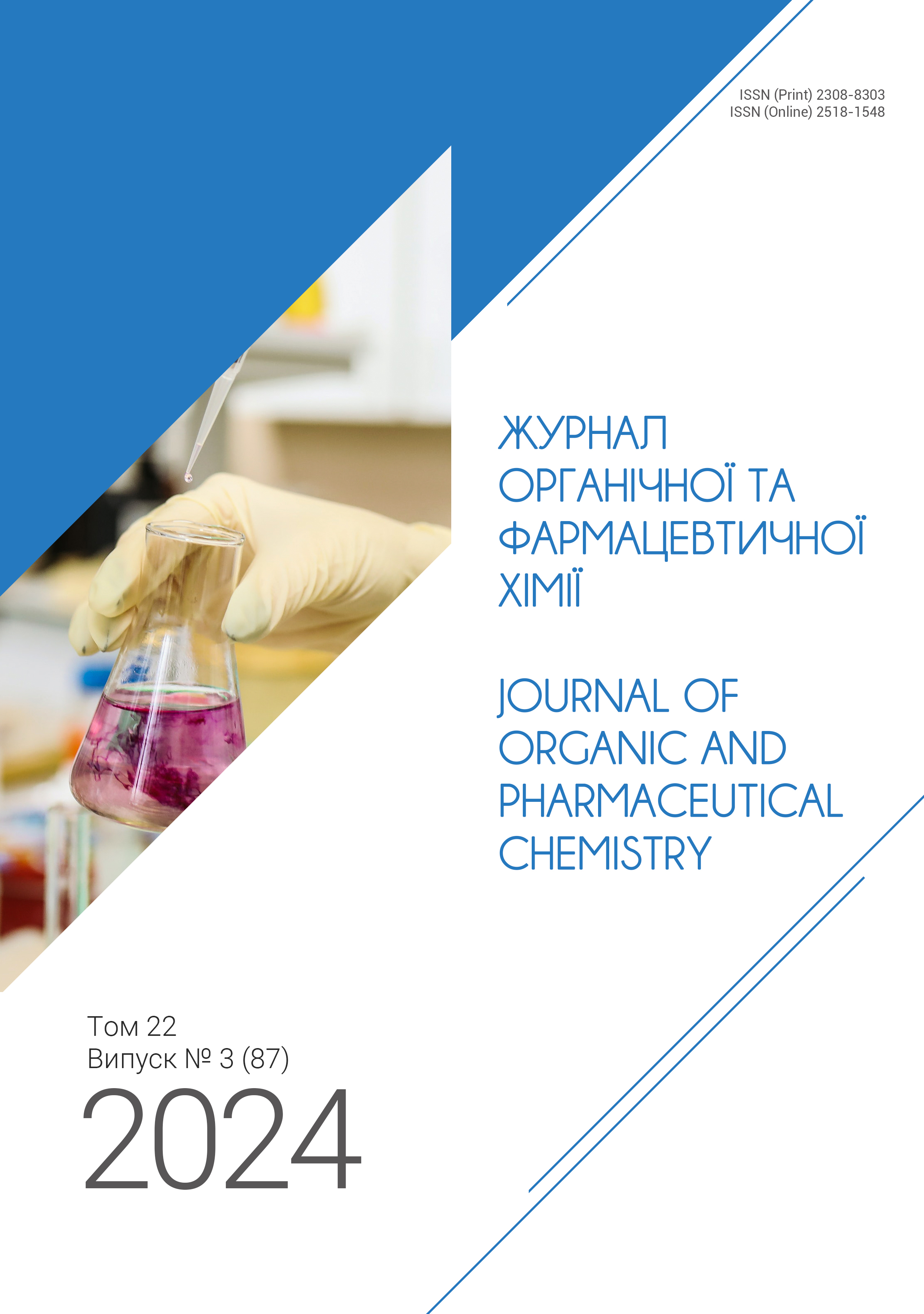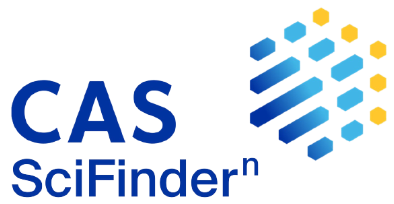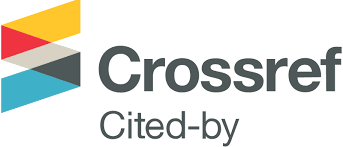Multigram Synthesis of 2-Azabicyclo[2.1.1]hexane-1-Carboxylates (2,4-Methanoprolines) – Promising Bicyclic Proline Analogs
DOI:
https://doi.org/10.24959/ophcj.24.314843Keywords:
bicyclic compounds, building blocks, proline analog, bridged pyrrolidine, amino acidAbstract
An optimized approach towards 4-substituted 2,4-methanoproline derivatives is reported. Careful selection of the starting materials and optimized isolation procedure provided easy access to a key bicyclic building block in a preparative yield of 32% over five laboratory steps of up to 0.7 kg. Further modifications allowed us to obtain a number of useful derivatives, including those containing NH2, COOH, CH2NH2, and CH2F fragments with orthogonally protected functionalities.
Supporting Agency
- This work was supported by Enamine Ltd. O. O. Grygorenko received additional funding from the Ministry of Education and Science of Ukraine, grant No. 0122U001962 (22BF037-02).
Downloads
References
- Lovering, F.; Bikker, J.; Humblet, C. Escape from Flatland: Increasing saturation as an approach to improving clinical success. J. Med. Chem. 2009, 52 (21), 6752 - 6756. https://doi.org/10.1021/jm901241e.
 |
|  |
| 
- Hamilton, D.J.; Dekker, T.; Klein, H. F.; Janssen, G. V.; Wijtmans, M.; O’Brien, P.; de Esch, I.J.P. Escape from planarity in fragment-based drug discovery: A physicochemical and 3D property analysis of synthetic 3D fragment libraries. Drug Discov. Today: Technologies 2020, 38, 77 - 90. https://doi.org/10.1016/J.DDTEC.2021.05.001.
 |
|  |
| 
- Cox, B.; Zdorichenko, V.; Cox, P. B.; Booker-Milburn, K. I.; Paumier, R.; Elliott, L. D.; Robertson-Ralph, M.; Bloomfield, G. Escaping from Flatland: Substituted bridged pyrrolidine fragments with inherent three-dimensional character. ACS Med. Chem. Lett. 2020, 11 (6), 1185 - 1190. https://doi.org/10.1021/acsmedchemlett.0c00039.
 |
|  |
| 
- Aldeghi, M.; Malhotra, S.; Selwood, D. L.; Chan, A. W. E. Two- and three-dimensional rings in drugs. Chem. Biol. Drug Des. 2014, 83, 450 - 461. https://doi.org/10.1111/cbdd.12260.
 |
|  |
| 
- Cox, B.; Booker-Milburn, K. I.; Elliott, L. D., Robertson-Ralph, M.; Zdorichenko, V. Escaping from flatland: [2+2] photocycloaddition; conformationally constrained sp3-rich scaffolds for lead generation. ACS Med. Chem. Lett. 2019, 10 (11), 1512 - 1517. https://doi.org/10.1021/acsmedchemlett.9b00409.
 |
|  |
| 
- Degorce, S. L.; Bodnarchuk, M. S.; Cumming, I. A.; Scott, J. S. Lowering lipophilicity by adding carbon: One-carbon bridges of morpholines and piperazines. J. Med. Chem. 2018, 61 (19), 8934 - 8943. https://doi.org/10.1021/acs.jmedchem.8b01148.
 |
|  |
| 
- Smyrnov, O.; Melnykov, K. P.; Semeno, V.; Liashuk, O. S.; Grygorenko, O. O. α-CF3-Substituted saturated bicyclic amines: Advanced building blocks for medicinal chemistry. Eur. J. Org. Chem. 2024, 27 (1), e202300935. https://doi.org/10.1002/ejoc.202300935.
 |
| 
- Meanwell, N. A. Applications of bioisosteres in the design of biologically active compounds. J. Agric. Food Chem. 2023, 71 (47), 18087 - 18122. https://doi.org/10.1021/acs.jafc.3c00765.
 |
|  |
| 
- Clemons, P. A.; Bodycombe, N. E.; Carrinski, H. A.; Wilson, J. A.; Shamji, A. F.; Wagner, B. K.; Koehler, A. N.; Schreiber, S. L. Small molecules of different origins have distinct distributions of structural complexity that correlate with protein-binding profiles. Proc. Natl. Acad. Sci. U. S. A. 2010, 107 (44), 18787 - 18792. https://doi.org/10.1073/pnas.1012741107.
 |
|  |
| 
- Krzyzanowski, A.; Pahl, A.; Grigalunas, M.; Waldmann, H. Spacial score – a comprehensive topological indicator for small-molecule complexity. J. Med. Chem. 2023, 66 (18), 12739 - 12750. https://doi.org/10.1021/acs.jmedchem.3c00689.
 |
|  |
| 
- Mykhailiuk, P. K. Saturated bioisosteres of benzene: where to go next? Org. Biomol. Chem. 2019, 17 (11) 2839 - 2849. https://doi.org/10.1039/C8OB02812E.
 |
|  |
| 
- Liu, J.; Han, J.; Izawa, K.; Sato, T.; White, S.; Meanwell, N. A.; Soloshonok, V. A. Cyclic tailor-made amino acids in the design of modern pharmaceuticals, Eur. J. Med. Chem. 2020, 208, 112736. https://doi.org/10.1016/j.ejmech.2020.112736.
 |
|  |
| 
- Boulton, D. W. Clinical Pharmacokinetics and Pharmacodynamics of Saxagliptin, a Dipeptidyl Peptidase-4 Inhibitor. Clin. Pharmacokinet. 2017, 56 (1), 11 - 24. https://doi.org/10.1007/s40262-016-0421-4.
 |
|  |
| 
- Reaxys® Database; https://www.reaxys.com/ (accessed on 03 Jun 2024).
- Bell, E. A.; Qureshi, M. Y.; Pryce, R. J., Janzen, D. H.; Lemke, P.; Clardy, J. 2,4-Methanoproline (2-carboxy-2,4-methanopyrrolidine) and 2,4-methanoglutamic acid (1-amino-1,3-dicarboxycyclobutane) in seeds of Ateleia herbert smithii Pittier (Leguminosae). J. Am. Chem. Soc. 1980, 102 (4), 1409 - 1412. https://doi.org/10.1021/ja00524a029.
 |
| 
- Kite, G. C.; Ireland, H., Non-protein amino acids of Bocoa (Leguminosae; Papilionoideae). Phytochem. 2002, 59 (2), 163 - 168. https://doi.org/10.1016/S0031-9422(01)00447-2.
 |
|  |
| 
- Montelione, G. T.; Hughes, P.; Clardy, J.; Scheraga, H. A. Conformational properties of 2,4-methanoproline (2-carboxy-2,4-methanopyrrolidine) in peptides: determination of preferred peptide bond conformation in aqueous solution by proton Overhauser measurements. J. Am. Chem. Soc. 1986, 108 (21), 6765 - 6773. https://doi.org/10.1021/ja00281a051.
 |
| 
- Piela, L.; Nemethy, G.; Scheraga, H. A. Conformational properties of 2,4-methanoproline (2-carboxy-2,4-methanopyrrolidine) in peptides: theoretical conformational energy analysis of restrictions of the polypeptide chain conformation. J. Am. Chem. Soc. 1987, 109 (15), 4477 - 4485. https://doi.org/10.1021/ja00249a009.
 |
| 
- Mykhailiuk, P. K.; Kubyshkin, V.; Bach, T.; Budisa, N. Peptidyl-prolyl model study: How does the electronic effect influence the amide bond conformation? J. Org. Chem. 2017, 82 (17), 8831 - 8841. https://doi.org/10.1021/acs.joc.7b00803.
 |
|  |
| 
- Juvvadi, P.; Dooley, D. J.; Humblet, C. C.; Lu, G. H.; Lunney, E. A.; Panek, R. L.; Skeean, R.; Marshall, G. R. Bradykinin and angiotensin II analogs containing a conformationally constrained proline analog. Int. J. Pept. Protein Res. 1992, 40 (3 - 4), 163 - 170. https://doi.org/10.1111/j.1399-3011.1992.tb00289.x.
 |
|  |
| 
- Mapelli, C.; Halbeek, H. Van; Stammer, C. H. Synthesis and conformational studies by 1H‐ and 13C‐NMR spectroscopy of a novel, sterically constrained analogue of thyrotropin‐releasing hormone. Biopolymers 1990, 29 (2), 407 - 422. https://doi.org/10.1002/bip.360290212.
 |
|  |
| 
- Cox, B.; Duffy, J.; Zdorichenko, V.; Bellanger, C.; Hurcum, J.; Laleu, B.; Booker-Milburn, K. I.; Elliott, L. D.; Robertson-Ralph, M.; Swain, C. J., Bishop, S. J.; Hallyburton, I.; Anderson, M. Escaping from flatland: antimalarial activity of sp3-rich bridged pyrrolidine derivatives. ACS Med. Chem. Lett. 2020, 11 (12), 2497 - 2503. https://doi.org/10.1021/acsmedchemlett.0c00486.
 |
|  |
| 
- Patel, A. B.; Malpass, J. R. Potential nicotinic acetylcholine receptor ligands from 2,4-methanoproline derivatives. J. Med. Chem. 2008, 51 (21), 7005 - 7009. https://doi.org/10.1021/jm800537a.
 |
|  |
| 
- Esslinger, C. S.; Koch, H. P.; Kavanaugh, M. P.; Philips, D. P.; Chamberlin, A. R.; Thompson, C. M.; Bridges, R. J. Structural determinants of substrates and inhibitors: probing glutamate transporters with 2,4-methanopyrroldidine-2,4-dicarboxylate. Bioorg. Med. Chem. Lett. 1998, 8 (21), 3101 - 3106. https://doi.org/10.1016/S0960-894X(98)00560-5.
 |
|  |
| 
- Levterov, V. V; Michurin, O.; Borysko, P. O.; Zozulya, S.; Sadkova, I. V; Tolmachev, A. A.; Mykhailiuk, P. K. Photochemical in-flow synthesis of 2,4-methanopyrrolidines: pyrrolidine analogues with improved water solubility and reduced lipophilicity. J. Org. Chem. 2018, 83 (23), 14350 - 14361. https://doi.org/10.1021/acs.joc.8b02071.
 |
|  |
| 
- Krow, G. R.; Herzon, S. B.; Lin, G.; Qiu, F.; Sonnet, P. E. Complex-induced proximity effects. Temperature-dependent regiochemical diversity in lithiation−electrophilic substitution reactions of N-Boc-2-azabicyclo[2.1.1]hexane. 2,4- and 3,5-Methanoprolines. Org. Lett. 2002, 4 (18), 3151 - 3154. https://doi.org/10.1021/ol026509b.
 |
|  |
| 
- Grygorenko, O. O.; Artamonov, O. S.; Palamarchuk, G. V; Zubatyuk, R. I.; Shishkin, O. V; Komarov, I. V Stereoselective synthesis of 2,4-methanoproline homologues. Tetrahedron: Asymmetry 2006, 17 (2), 252 - 258. https://doi.org/10.1016/j.tetasy.2005.12.009.
 |
| 
- Homon, A. A.; Hryshchuk, O. V.; Mykhailenko, O. V.; Vashchenko, B. V.; Melnykov, K. P.; Michurin, O. M.; Daniliuc, C. G.; Gerus, I. I.; Kovtunenko, V. O.; Kondratov, I. S.; Grygorenko, O. O. 4-(Di-/Trifluoromethyl)-2-heterabicyclo[2.1.1]hexanes: Advanced fluorinated phenyl isosteres and proline analogues. Eur. J. Org. Chem. 2021, 2021 (47), 6580 - 6590. https://doi.org/10.1002/ejoc.202100414.
 |
| 
- Vasiuta, R. I.; Gorichko, M. V Synthesis of 4-hydroxymethyl-2,4-methanoproline. Tetrahedron Lett. 2014, 55 (2), 466 - 468. https://doi.org/10.1016/j.tetlet.2013.11.062.
 |
| 
- Holovach, S.; Melnykov, K. P.; Skreminskiy, A.; Herasymchuk, M.; Tavlui, O.; Aloshyn, D.; Borysko, P.; Rozhenko, A.B.; Ryabukhin, S. V; Volochnyuk, D. M.; Grygorenko, O. O. Effect of gem-difluorination on the key physicochemical properties relevant to medicinal chemistry: the case of functionalized cycloalkanes. Chem. Eur. J. 2022, 28 (19), e202200331. https://doi.org/10.1002/chem.202200331.
 |
|  |
| 
- Nair, A. S.; Singh, A. K.; Kumar, A.; Kumar, S.; Sukumaran, S.; Koyiparambath, V. P.; Pappachen, L. K.; Rangarajan, T. M.; Kim, H., Mathew, B. FDA-approved trifluoromethyl group-containing drugs: A review of 20 years. Processes 2022, 10 (10), 2054. 1 https://doi.org/10.3390/pr10102054.
 |
| 
- Han, J.; Remete, A. M.; Dobson, L. S.; Kiss, L.; Izawa, K.; Moriwaki, H.; Soloshonok, V. A.; O’Hagan, D. Next generation organofluorine containing blockbuster drugs. J. Fluor. Chem. 2020, 239, 109639. https://doi.org/10.1016/j.jfluchem.2020.109639.
 |
| 
- der Born, D. Van; Pees, A.; Poot, A .J.; Orru, R. V. A., Windhorst, A. D.; Vugts, D. J. Fluorine-18 labelled building blocks for PET tracer synthesis. Chem. Soc. Rev. 2017, 46 (15), 4709 - 4773. https://doi.org/10.1039/C6CS00492J.
 |
|  |
| 
- Shah, P.; Westwell, A. D. The role of fluorine in medicinal chemistry. J. Enzyme Inhib. and Med. Chem. 2007, 22 (5), 527 - 540. https://doi.org/10.1080/14756360701425014.
 |
|  |
| 
- Henary, E.; Casa, S.; Dost, T. L.; Sloop, J. C.; Henary, M. The role of small molecules containing fluorine atoms in medicine and imaging applications. Pharmaceuticals 2024, 17 (3). https://doi.org/10.3390/ph17030281.
 |
|  |
| 
- L’heureux, A.; Beaulieu, F.; Bennett, C.; Bill, D. R.; Clayton, S.; Laflamme, F.; Mirmehrabi, M.; Tadayon, S.; Tovell, D.; Couturier, M. Aminodifluorosulfinium salts: selective fluorination reagents with enhanced thermal stability and ease of handling. J. Org. Chem. 2010, 75 (10), 3401 - 11. https://doi.org/10.1021/jo100504x.
 |
|  |
| 
- Mohammadkhani, L.; Heravi, M. M. XtalFluor-E: A useful and versatile reagent in organic transformations. J. Fluorine Chem. 2019, 225, 11 - 20. https://doi.org/10.1016/J.JFLUCHEM.2019.06.006.
 |
| 
- Karabatsos, G. J.; Graham, J. D. Carbonium ion rearrangement of the neopentyl system. J. Am. Chem. Soc. 1960, 82 (19), 5250 - 5251. https://doi.org/10.1021/ja01504a063.

- Scriven, E.; Turnbull, K. Azides: their preparation and synthetic uses. Chem. Rev. 1988, 88(2), 297 - 368. https://doi.org/10.1021/cr00084a001.
 |
| 
- Corey, E. J.; Link, J. O. A general, catalytic, and enantioselective synthesis of α-amino acids. J. Am. Chem. Soc. 1992, 114 (5), 1906 - 1908. https://doi.org/10.1021/ja00031a069.
 |
| 
- Carlsen, P.; Katsuki, T.; Martin, V. S.; Sharpless, K. B. A greatly improved procedure for ruthenium tetroxide catalyzed oxidations of organic compounds. J. Org. Chem. 1981, 46 (19), 3936 - 3938. https://doi.org/10.1021/jo00332a045.
 |
| 
- Conti, P.; Caligiuri, A.; Pinto, A.; Roda, G.; Tamborini, L.; Nielsen, B.; Madsen, U.; Frydenvang, K.; Colombo, A.; De Micheli, C. Synthesis and pharmacological evaluation of novel conformationally constrained homologues of glutamic acid. Eur. J. Med. Chem. 2007, 42 (8), 1059 - 1068. https://doi.org/10.1016/j.ejmech.2007.01.013.
 |
|  |
| 
- Koch, H. P., Kavanaugh, M. P.; Esslinger, C. S.; Zerangue, N.; Humphrey, J. M.; Amara, S. G.; Chamberlin, A. R.; Bridges, R. J. Differentiation of Substrate and Nonsubstrate Inhibitors of the High-Affinity, Sodium-Dependent Glutamate Transporters. Mol. Pharmacol. 1999, 56 (6), 1095 - 1104. https://doi.org/10.1124/mol.56.6.1095.
 |
|  |
| 
- Armarego, W. L. F. Purification of Laboratory Chemicals, 9th ed.; Butterworth-Heinemann: Elsevier 2022 ISBN 978-0-12-805457-4
- Cochrane, W. P.; Pauson, P. L.; Stevens, T. S. Synthesis of 3-oxabicyclo[3.1.1]heptanes by rearrangement of 3-oxaspiro[3.3]heptanes. J. Chem. Soc., C: Organic 1969, 18, 2346. https://doi.org/10.1039/j39690002346.

Downloads
Additional Files
Published
How to Cite
Issue
Section
License
Copyright (c) 2024 National University of Pharmacy

This work is licensed under a Creative Commons Attribution 4.0 International License.
Authors publishing their works in the Journal of Organic and Pharmaceutical Chemistry agree with the following terms:
1. Authors retain copyright and grant the journal the right of the first publication of the work under Creative Commons Attribution License allowing everyone to distribute and re-use the published material if proper citation of the original publication is given.
2. Authors are able to enter into separate, additional contractual arrangements for the non-exclusive distribution of the journal’s published version of the work (e.g., post it to an institutional repository or publish it in a book) providing proper citation of the original publication.
3. Authors are permitted and encouraged to post their work online (e.g. in institutional repositories or on authors’ personal websites) prior to and during the submission process, as it can lead to productive exchanges, as well as earlier and greater citation of published work (see The Effect of Open Access).















